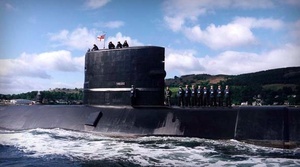The Royal Navy’s troubled HMS Tireless nuclear submarine has been forced back to port in Devonport, England after a small leak of coolant in its reactor system was discovered, Royal Navy sources reported.
The Royal Navy said the leak of coolant was contained within the reactor compartment of the 4,800-ton Trafalgar-class hunter-killer vessel.
The HMS Tireless initially returned to Faslane Naval Base in Scotland where the leak was inspected – something sure to fuel heated debate about nuclear submarines operating in Scottish waters, Scotland’s Express newspaper reported.
The sub was then sent to Plymouth in southeast England’s Devenport for repairs, the local daily Plymouth Herald reported.
The sub had been undergoing training exercises for new officers off Scotland’s west coast when the leak was discovered.
Coolant leaks have become something of an nerve-jarring term since the catastrophe at Japan’s Fukushima Daiichi nuclear power plant, where all back-up and battery systems for coolant led to a triple meltdown on March 11, 2011.
The Royal Navy said in a statement that the leak “posed no risk to the public, the environment or the crew,” adding that it didn’t know how long it would take to repair the 28-year-old submarine.
The vessel is expected to be decommissioned this year, the BBC reported.
The navy has openly admitted in the British media that the HMS Tireless and it’s four sister Trafalgar-class vessels still in service were “designed as Cold War warriors” and are now having to adapt to the demands of the 21st Century.
Yet it also said in its statement that it has “no intention” of carrying out checks on the other Trafalgar-class subs in operation.
The Navy’s statements have reflected that it views any problems with any of the vessels nuclear systems as serious, but was also quick to say that such systems are contained in a sealed off compartment.
Additionally, said the Navy, there are procedures to prevent leaks of radioactivity from the vessel.
But the coolant leak is just one in several the HMS Tireless has experienced during its deployment.
In 2010 it was revealed that inspections were undertaken on the entire fleet of Trafalgar class submarines after valves designed to release pressure from steam generators in an emergency were found to be blocked off aboard HMS Turbulent and HMS Tireless.
In 2007, two mechanics died on board the HMS Tireless when a self-contained oxygen generator exploded while the vessel was under the North Pole.
The vessel was sailing under an ice pack 275 kilometers north of Deadhorse, in Prudhoe Bay, Alaska, when the accident happened.
In 2000, a fault was discovered on board which then forced 12 hunter-killer nuclear submarines in the UK’s fleet to undergo intensive inspections.
The HMS Tireless also became stranded in Gibraltar in May of the same year with a leak in pipe works leading from the nuclear reactor system.
It remained there for nearly a year while repairs were carried out, putting a strain on England’s relations with Spain, and drawing criticism from environmentalists.
In May 2003, it was taken to Scotland for repairs prompting a Ministry of Defence inquiry after it collided with an object at sea.
Other incidents with British submarines in the recent past include the HMS Astute running aground off the west coast of Scotland in 2010, adding to tensions between London and Scotland, which wishes to have its non-nuclear status respected.




